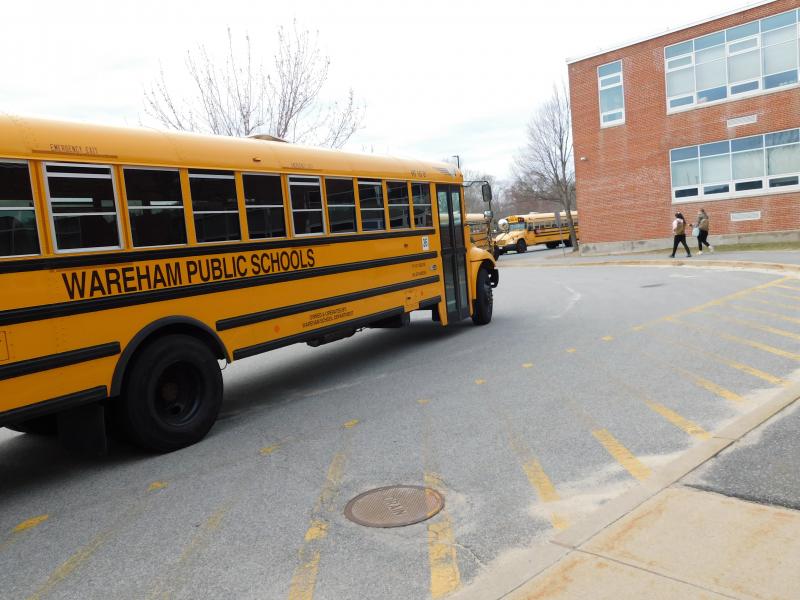School Councils provide principals with perspective
They say it takes a village to raise a child.
The same could probably be said for the student — because it's true. However, it’s not always easy to gather all of the village’s perspectives when that village consists of administration, teachers, staff, parents, community members and the students themselves.
Therefore, once a month, three groups representative of the Wareham Public Schools village meet at each of their respective schools to take part in decisions on site., an initiative implemented by the state in 1993 through the Education Reform Act.
These groups, known as School Councils, are required by the state in order to encourage an open dialogue that can shape policies and improve the school system for all.
According to the Massachusetts Department of Elementary and Secondary Education, site-based decision making puts the schools at the center of “planning, goal setting and budgeting for school improvement.”
The department said not only will this group be able to identify “innovative” and “creative” opportunities, but will be most “responsive” to the needs of their school population.
Wareham High School Principal Scott Palladino said, “It’s actually a great organization to provide guidance to the principal for the school.”
The most recent high school council meeting focused on the International Baccalaureate Diploma Program. The school hired a consultant to evaluate the program and suggest next steps. The study found the school needing improvement, including challenges such as curriculum planning, class scheduling, inaccessibility and finances.
Although the School Committee had opportunities to ask questions and discuss the report’s findings, the School Council gave an opportunity for others to weigh in on the fate of the program, especially parents whose students may be in the program or alumni.
Palladino said throughout the Covid pandemic, the School Council was able to vet everything the school needed to implement to keep learning going.
“Everything kind of starts here,” he said, adding that many academic programs were established as a result of the Council’s work, including dual enrollment, the International Baccalaureate Program and Advanced Placement offerings.
The Council also reviews the school's handbook and make recommendations — such as with athletic eligibility requirements — and develops the official School Improvement Plan, according to Palladino. Most of the recommendations the group has are then brought before the School Committee.
He highlighted how “unique” it is to have the perspective of parents on the Council who also attended the school.
“Having students on the [Council] really gives their perspective of what they‘re dealing with and they always have awesome advice,” Palladino added.
Joyce Bacchiocchi and Jill Johnson are community members on the council whose children have since graduated.
Bacchiocchi said she joined the high school council back in 2006 when her son was a freshman though she initially became involved in other capacities with the schools when her children were in elementary school.
Johnson, who joined in 2015, said she appreciates the council and the opportunities she has to learn more about the school and how it operates and is able to provide input when it makes decisions — even if that may only have a small influence on the final decision.
The value, she said, is in the ability to understand why certain decisions had to be made.
Bacchiocchi said, “When I talk to people who want to be involved in the schools, I always tell them School Council is a great way to be involved as a parent because like I said, it really gives you that access to the people inside the school and in the decisions that are being made for the students.”
Middle School Principal Tracie Cote said in addition to developing the School Improvement Plan, her School Council’s primary goal “is to guide with the school budget.”
Cote highlighted how the Council can give helpful recommendations on what could be cut and where more money should be invested, especially in regard to implementing those school improvements.
“In the last five to six years, we’ve made tremendous improvements,” she said.
For example, Cote described the different capital improvements the school has been able to make at the guidance of the School Council, including getting the new roof installed — with more work to the roof coming this summer.
The gymnasium was also renovated with fresh paint, new bleachers and redone floors, according to Cote. This was completed “just to make it a beautiful place that will be standing for years to come.”
“I always have a great team working with me every year,” she said, adding it may look slightly different from year to year, but the quality of work remains the same. “We really rely on our School Councils as principals to really guide and support us to really have that different lens.”
Wareham Elementary School Principal Bethany Chandler said while her School Council also completes policy reviews and a School Improvement Plan, they have also been inviting guest speakers to their meetings.
For example, the School Council was considering its options for the school’s photographer and after inviting a company to pitch at a meeting, the Council was able to make an informed decision together and choose the company that satisfied the most people.
Chandler said the Council is a resource for different perspectives that the school would be unable to get otherwise such as from parents on topics such as report cards and curriculum.
For example, she said a parent on the Council pointed out to her how it needs to be clear to parents that a form of identification is required to dismiss their child.
“I know that sounds simple, but it’s something that was overlooked,” Chandler said. “They have a keen eye on being able to recognize what I may not be able to see as a school principal. They have a different lens to it all.”















